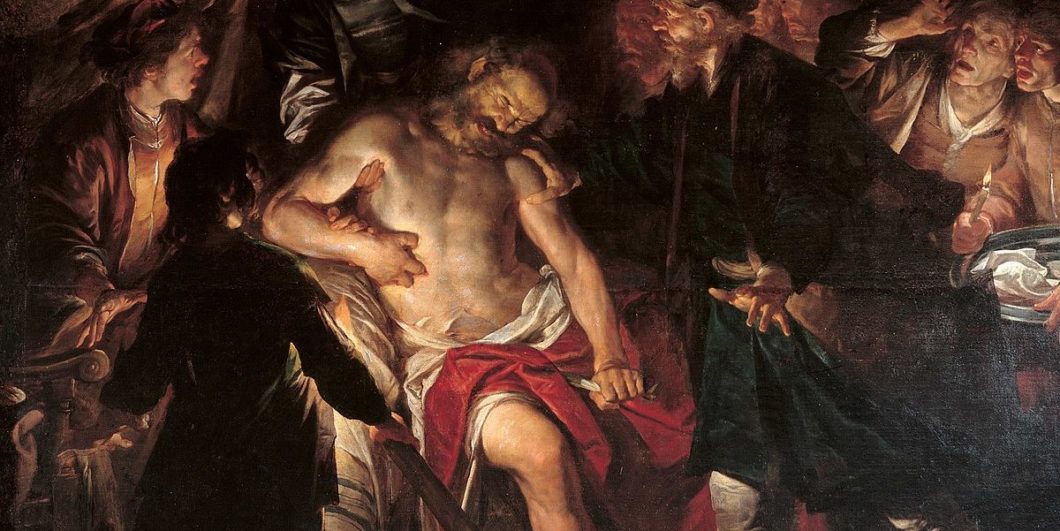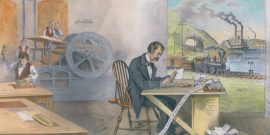It is good to stay healthy, but today's narcissistic gym culture leads away from the path of virtue.
Cato the Younger: Roman Citizen
“Crawling upon the slime of the earth, I do not for all that cease to observe up in the clouds the inimitable height of some heroic souls.”
Thus Michel de Montaigne begins his essay on Cato the Younger. With much right, Cato the Younger has long been counted among the heroes of the Roman Republic. His deeds, and especially his last deed, have been lauded by poets, philosophers, and biographers as a paradigm of excellence in the most trying of circumstances. Cato’s life occurs within the final moments of the Roman Republic, and it is not without some justice that his death is counted as coincident with the death of that regime. Fred K. Drogula’s historical biography of the man, Cato the Younger: Life and Death at the End of the Roman Republic, provides a thorough account of both Cato and the end of the Roman Republic that serves well the reader who wishes to meditate on what may be asked of those facing the possible collapse of their regime and how nobly to answer such a challenge.
Drogula begins with the Younger’s familial and political inheritance from Cato the Elder, traces the former’s education and ascent through the cursus honorum, and details the various political tactics—both successful and unsuccessful—that Cato employed to stem Rome’s precipitous turn toward tyranny. The book presupposes such a familiarity with the history of the Republic and the inner workings of its offices and institutions that it would not be easy reading for a neophyte. But neither does Drogula too much mire himself in the internecine squabbles of historical scholars, and thereby avoids making the book comprehensible only to a specialized few. The footnotes are sparse but helpful, and when contemporary classicists do make an appearance in the body of the work, Drogula marshals or dispatches them with clarity and efficiency. The breadth and detail of the biography are buoyed by an overarching argument to which Drogula returns frequently enough to provide the reader consistent orientation.
The primary task of Drogula’s biography is to dismantle Cato’s reputation as a Stoic philosopher and replace it with an account of Cato as a thoroughly Roman citizen-politician who, though admittedly eccentric in his practices, nevertheless relentlessly operated within and wielded the Roman tradition. This argument is persuasive. Less persuasive is Drogula’s corollary that by his stalwart preservation of the Republican tradition Cato catalyzed the end of that tradition.
Stoic Sage or Patriotic Politician?
Drogula makes a comprehensive case that, far from being a paradigm of Stoic philosophy, with its attendant cosmopolitanism, Cato is better understood as a politician dedicated to maintaining the regime of the Republic and its mores. Drogula draws evidence for this argument from Cato’s family, his education, and his temperament. Most convincing of all is Drogula’s account of how and why Cato came to have his reputation for Stoicism.
Drogula starts with Cato’s namesake, Cato the Elder, who was the first of the Catonian clan to achieve political distinction. Cato the Elder was known for his austere attendance to his familial, military, and political duties as well as strict adherence to tradition. Devotion to the mos maiorum, or ancestral values and customs, meant for Cato the Younger deference not only to the storied generations of the early Republic but also to his own grandfather. Although he never achieved the rank of consul as his grandfather did, Cato the Younger found in the Elder a nearby and specifically Roman exemplar for advancement through an unyielding commitment to both personal and political principles. Drogula points out Cato the Elder’s particular contempt for Greek culture, a contempt that the Younger did not entirely share but which does suggest his posture toward Greek thought and practice was less one of approval than expedient appropriation.
Like many aristocratic Romans of his generation, Cato the Younger received some education in Greek thought. Drogula notes, however, that this education was by no means exclusively Stoic. In addition to studying with the Stoic Antipater, Cato also learned from the Epicurean Philostratus and the Peripatetic Demetrius. The singular mannerisms which Cato adopted in his youth—the eschewal of luxury (including traveling by horseback), wearing a tunic under his toga, and even donning shoes—may smack of Stoic austerity, but these practices belong to ancient, even fabulous, Roman tradition. Drogula argues that Cato took on these extreme practices with the intention of cultivating and projecting an ideal of dedication to the mos maiorum. Although Drogula at first wavers on the question of whether Cato’s eccentricity is merely a political ploy, Cato’s impressive consistency ultimately puts the question to rest: even if these habits were initially strategic, they certainly became an integral part of Cato’s character.
Other aspects of Cato’s character also undermine the thesis that he was an adherent to Stoicism. The pursuit of apatheia—lack of intense desire or feeling—which is an essential element of Stoic practical philosophy, was no guiding light for Cato. As is clear from his outbursts of anger towards fellow Roman politicians whom he saw as abandoning their duties to the Republic, his dogged and heated filibustering (and, on occasion, physical confrontation) in the Senate, his zealous promotion of his own glory, and his open weeping at the sight of Romans slain by other Romans in the civil war, Cato never lacked intense desire or feeling. Although there are other examples of pathos and animus in his private life, most moving is his ardor for the Republic and her citizens, a passion without which Cato’s speeches and deeds become incomprehensible.
Drogula deploys his two-step argument—negating evidence of Stoicism and supplying alternate evidence of patriotism or personality—throughout the book. But his coup de grace comes in the epilogue, where he succinctly argues that Cato’s most seemingly Stoic move, his suicide, is in fact yet another entry in his long commitment to Roman tradition, which is rife with Romans who chose to die by their own hand rather than live in a state of dishonor. Given that Cato clearly saw the success of Caesar as the death of the Republic and therewith all the values he held most dear, Cato’s gory suicide is a final act of devotion rather than a disinterested self-exemption.
This biographical account is persuasively supplemented by a historiographical account, which traces the posthumous construction of Cato’s Stoic persona by writers both contemporary and subsequent. The reason that Cicero and others (including the soon-to-be assassin, Brutus) laud Cato as a philosopher is because they could not safely praise him as a statesman in Caesar’s Rome. Thus in a private letter, Cicero writes of Cato that “the opposite of what normally happens in most people happened in him: that all things were greater in fact than in report.”
Prudential Foresight or Self-Fulfilling Prophecy?
Drogula is not entirely alone in his position that Cato is a politician rather than a sage. Even Plutarch, although a primary perpetuator of Cato’s philosophical persona, averred that Cato was first and foremost a statesman. And some 17 centuries later, here is Rousseau: “Cato had the cause of his country always at heart; he lived for it alone, and could not bear to outlive it. …Socrates instructed a few individuals, opposed the Sophists, and died for truth: but Cato defended his country, its liberty and its laws, against the conquerors of the world, and at length departed from the earth, when he had no longer a country to serve.”
If, then, Cato is preeminently a statesman, how did he serve his regime? His political career, founded on and defined by his conspicuous and eccentric commitment to the mos maiorum, was directed to the end of preserving and strengthening the institutions of the Republic against those whose desire for personal power would erode and finally incapacitate those institutions. Drogula notes that Cato was not perfectly consistent in the application of his principles; for example, despite his career-long fight against political bribery, he himself used it. Yet even this exception was for the sake of defeating Caesar in elections. The ne plus ultra principle of Cato’s politics was to prevent the capture of public power by ambitious individuals, like Caesar and Pompey. He even sided with granting extraordinary power to Pompey in the face of the greater threat Caesar posed. But, according to Drogula, this intransigence against the coming tide of tyranny was precisely Cato’s mistake.
Drogula suggests that Cato’s inability to compromise with men like Caesar, and ultimately with Caesar himself, was the cause of more and more aggressive moves to consolidate political power. According to Drogula, instead of nobly and sternly opposing an imminent danger that he discerned with shrewd foresight, Cato helped create the crisis. Here Drogula deploys a kind of abuser’s logic, as if Caesar could say, “Look what you made me do, Cato.” The consequence of this logic is appeasement; Drogula suggests that had Cato sated Caesar’s desire for power by strategically compromising, then the civil war and with it the death of the Republic would have been delayed, if not entirely averted. Drogula cannot exactly argue this point, as it is based on a counterfactual, but he fails even to substantiate its probability.
For example, Drogula grounds Cato’s inability to compromise with Caesar in a long-standing hatred that Cato held for Caesar, a hatred that Drogula intimates was itself due to little more than personal contempt. But this inference is based on a lack of evidence rather than a positive indication; Drogula does not entertain the possibility that Cato detected Caesar’s rapacious ambition from the beginning. In fact, Drogula never has a bad word against Caesar and never mentions other sources that note Caesar’s desire for power. Cato weeps at the sight of the Romans killed in civil strife; Caesar weeps only upon reading of Alexander’s conquests. There is little reason, and it is likely Cato saw little reason, for thinking that appeasing Caesar would have saved the Republic.
To return to the essai on Cato the Younger, Montaigne spends a moment to revile those who delight in diminishing the great men of the past:
I observe most of the wits of these times pretend to ingenuity, by endeavouring to blemish and darken the glory of the bravest and most generous actions of former ages, putting one vile interpretation or another upon them, and forging and supposing vain causes and motives for the noble things they did: a mighty subtlety indeed!
Drogula does not quite earn Montaigne’s wrath. In his biography, Drogula never downplays Cato’s strength, discipline, and resolve. Cato’s inflexibility is always in service of what he sees as the good of the Republic and her citizens. And despite Drogula’s hesitancy to ascribe to Cato the virtue of prudence in addition to courage and self-control, the reader comes away with a rich picture of a statesman devoted to his regime even unto its end.



